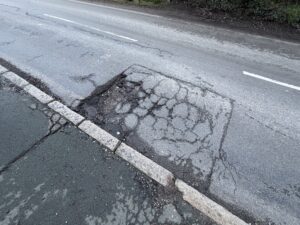The Road Surface Treatments Association (RSTA) has responded to claims by the RAC that roads in the UK are in ‘desperate’ need of repair, saying there was a missed opportunity to address this during the pandemic.
Paul Boss, RSTA Chief Executive said a significant amount of work was completed during the pandemic as soon as work was allowed, but road operators still had the same amount of money to work with..
He told Highways News: “Local highway authorities worked quickly to obtain key worker status for highway maintenance operatives at the beginning of the pandemic lock down to enable them to continue work and take advantage of the quieter roads to undertake much needed works that would have caused delays to drivers during normal times. Unfortunately, works could still only be completed within the allocated budgets available, there was no increased funding for highway maintenance as a result of the pandemic and therefore although traffic delays were avoided whilst the works undertaken earlier in the year, as the funding for and volume of works remained the same, this did nothing to improve the overall road maintenance backlog.”
The RAC said there was a ‘golden opportunity’ to carry out much-needed road repairs during the pandemic has been missed, according to the RAC.
This is in response to a new government report, which has shown the number of roads managed by local authorities in need of repairs across England has remained the same for the past two years.
The report shows that 4% of A roads were categorised as needing repairs in 2020/2021, the same as in 2019/2020, and a slight increase on the year before.
It also shows 6% of B and C roads in need of repairs, a proportion which has remained the same over five years.
The figures account for road conditions in the years ending March 2020 and March 2021.
In the report, the Department for Transport (DfT) points out that the pandemic “has had a wide impact since March 2020, and figures should be considered within this context.”
The report goes on to say that COVID-19 limited the availability of specialists, reducing the government’s ability to coordinate maintenance.
The RAC has nonetheless expressed its disappointment that the decline in traffic levels and quieter roads in lockdown weren’t taken advantage of to make progress in mounting road maintenance.
RAC head of roads policy Nicholas Lyes said: “We had hoped that the fact so few people were using the roads last year because of the pandemic would have given councils a golden opportunity to catch up on much-needed road repairs.
“Sadly, this data appears to show there’s still a huge amount to be done. Given that most roads looked after by councils are minor ones, it’s hugely concerning – and rather disappointing – that an increasing proportion are ear-marked for maintenance, particularly with so many already in need of repair.
“What’s more, unclassified roads in more rural areas tend to have poor safety records compared to their major road counterparts, so crumbling infrastructure only adds to the risks faced by both drivers and cyclists.”
Estimates released earlier this year show that traffic fell by 27% during the pandemic, with car traffic specifically dropping by 31%.
But, despite much of the country being stuck indoors due to a national lockdown, RAC patrols had to assist as many as 4,694 drivers – many of whom had likely broken down as a result of hitting a pothole – in the first three months of 2021, the equivalent of 52 drivers every day.
In March, an Asphalt Industry Alliance (AIA) report revealed it would take more than £10 billion to help repair roads in England and Wales to target conditions.
























